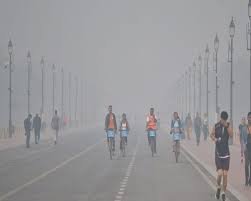
Delhi’s air pollution reached alarming levels on Sunday, prompting the implementation of Stage 4 measures under the Graded Response Action Plan (GRAP) across the National Capital Region (NCR) starting Monday. The city’s Air Quality Index (AQI) climbed to 457, placing it in the “severe plus” category, raising significant health concerns for residents.
GRAP Stage 4: Restrictions and Measures
GRAP Stage 4 enforces stringent measures to curb emissions and limit further deterioration of air quality. Key restrictions include:
- Ban on Diesel Vehicles: Diesel-run medium and heavy goods vehicles registered in Delhi (BS-IV or below) are banned, except those carrying essential goods.
- Limits on Commercial Vehicles: Non-essential light commercial vehicles from outside Delhi are prohibited unless they run on cleaner fuels like CNG, BS-VI diesel, or are electric.
- Restriction on Trucks: Trucks carrying non-essential items are barred from entering Delhi unless operating on LNG, CNG, or BS-VI diesel.
- Adjustments in Schools and Workplaces:
- Classes 6 to 9 and class 11 are recommended to shift to online mode.
- Offices in NCR are advised to operate at 50% capacity, with remaining employees working remotely.
AQI and Contributing Factors
Out of Delhi’s 40 monitoring stations, 32 reported AQI levels above 400, which is classified as “severe.” An AQI between 401-450 is “severe,” while levels above 450 fall into the “severe plus” category, posing serious health risks even for healthy individuals and critical impacts for those with pre-existing conditions.
The Central Pollution Control Board (CPCB) noted PM2.5 as the primary pollutant, posing significant health risks by penetrating deep into the lungs. On Sunday, vehicles accounted for 15.8% of the city’s pollution, while stubble burning contributed 25% of the total pollution the previous day.
Public Health Concerns
The “severe plus” AQI levels demand urgent action as prolonged exposure can cause respiratory issues, cardiovascular problems, and exacerbate existing health conditions. The Centre’s Decision Support System for Air Quality Management highlighted the need for collective measures to mitigate health risks.
Call for Action
Authorities have urged citizens to adopt sustainable practices, avoid unnecessary vehicular movement, and limit outdoor activities. With GRAP Stage 4 in effect, officials hope to see an improvement in air quality over the coming days.
Sources By Agencies

